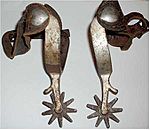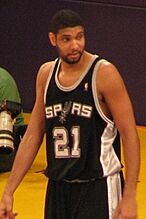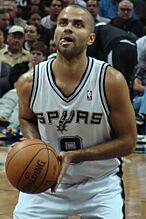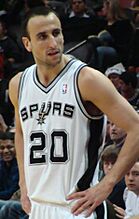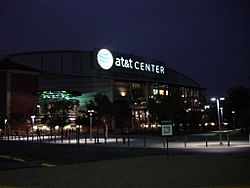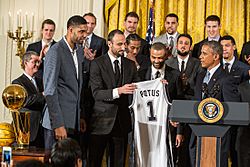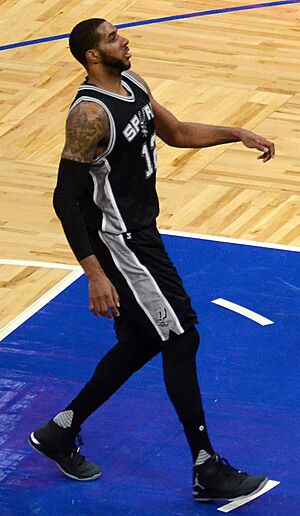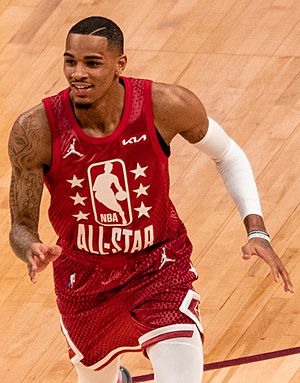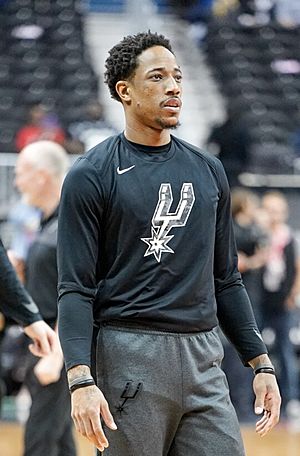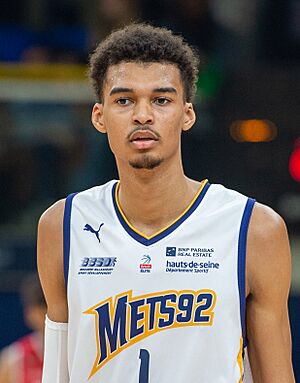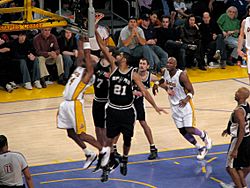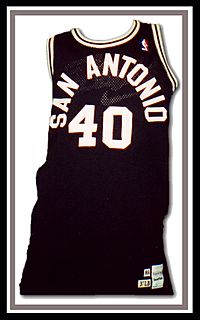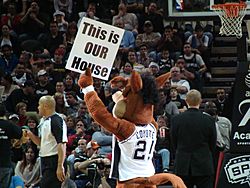San Antonio Spurs facts for kids
Quick facts for kids San Antonio Spurs |
|||
|---|---|---|---|
 |
|||
| Conference | Western | ||
| Division | Southwest | ||
| Founded | 1967 | ||
| History |
|
||
| Arena | Frost Bank Center | ||
| Location | San Antonio, Texas | ||
| Team colors | Silver, black, white |
||
| Main sponsor | Frost Bank | ||
| CEO | R. C. Buford | ||
| President | Gregg Popovich | ||
| General manager | Brian Wright | ||
| Head coach | Mitch Johnson | ||
| Ownership | Spurs Sports & Entertainment (Peter John Holt, Chairman and CEO) | ||
| Affiliation(s) | Austin Spurs | ||
| Championships | 5 (1999, 2003, 2005, 2007, 2014) | ||
| Conference titles | 6 (1999, 2003, 2005, 2007, 2013, 2014) | ||
| Division titles | 22 (1978, 1979, 1981, 1982, 1983, 1990, 1991, 1995, 1996, 1999, 2001, 2002, 2003, 2005, 2006, 2009, 2011, 2012, 2013, 2014, 2016, 2017) | ||
| Retired numbers | 10 (00, 6, 9, 12, 13, 20, 21, 32, 44, 50) | ||
|
|||
The San Antonio Spurs are a professional basketball team from San Antonio, Texas. They play in the National Basketball Association (NBA) as part of the Western Conference. Their home games are held at the Frost Bank Center. The Spurs are special because they are one of only four teams from the old American Basketball Association (ABA) that are still in the NBA today. They are also one of only two former ABA teams to have won an NBA championship, and the only one to have won multiple championships!
The Spurs have won the NBA championship five times: in 1999, 2003, 2005, 2007, and 2014. For many years, they were known for winning a lot of games. From 1999–2000 to 2016–17, they won 50 games or more every season, which is an amazing record of 18 years in a row! They also made it to the playoffs for 22 straight seasons, tying an NBA record. A lot of this success happened when Gregg Popovich was their head coach, and when superstar players like David Robinson and Tim Duncan were on the team. In the 2022–23 season, the Spurs celebrated their 50th anniversary.
Contents
- The Spurs in San Antonio Community
- Team History
- Early Years as the Dallas Chaparrals (1967–1973)
- Moving to San Antonio and Becoming the Spurs (1973–1976)
- The George Gervin Era (1976–1985)
- Challenging Years (1985–1989)
- The David Robinson Era (1989–1997)
- The Tim Duncan Era (1997–2016)
- Post-Duncan Era (2016–2023)
- The Victor Wembanyama Era (2023–Present)
- Team Rivalries
- Team Logo and Uniforms
- Recent Season Records
- Arena History
- Team Personnel
- Individual Awards
- Head Coaches
- See also
The Spurs in San Antonio Community
Spurs players are very involved in the San Antonio community. Many former Spurs players still live in the city and help out. For example, David Robinson works with the Carver Academy, and George Gervin is involved with the George Gervin Youth Center. The Spurs have always had great fan support. They set NBA attendance records when they played at the Alamodome, including the largest crowd ever for an NBA Finals game in 1999. Even now, they regularly sell out the smaller Frost Bank Center.
Every February, the Frost Bank Center hosts the San Antonio Stock Show & Rodeo. This means the Spurs have to go on a long road trip, which fans call the "Rodeo Road Trip." Even during these trips, the Spurs often win many games. When the Spurs win an NBA title, their victory parades are unique boat trips along the beautiful San Antonio River Walk.
Team History
Early Years as the Dallas Chaparrals (1967–1973)
The San Antonio Spurs actually started out as the Dallas Chaparrals in the original American Basketball Association (ABA). They began playing in 1967. The team had some good seasons but struggled to get fans interested in Dallas. They even tried to play games in other Texas cities like Fort Worth and Lubbock for a season, calling themselves the "Texas Chaparrals," but it didn't work out. They returned to Dallas full-time in 1971.
Moving to San Antonio and Becoming the Spurs (1973–1976)
By 1973, the Chaparrals were having money problems. Most of the owners wanted to sell the team. A group of 35 businessmen from San Antonio, led by Angelo Drossos, John Schaefer, and Red McCombs, made a deal to bring the team to San Antonio.
At first, the team was going to be called the San Antonio Gunslingers, but before they played a game, the name was changed to the Spurs. The team's colors also changed from red, white, and blue to the black, silver, and white we know today. In their first game in San Antonio, at HemisFair Arena, the Spurs lost but had a great crowd of 6,000 fans.
The early Spurs team was known for its strong defense. Key players included James Silas and Swen Nater, who won the Rookie of the Year award. In January 1974, the Spurs got George Gervin from another team, which was a big deal! The Spurs finished their first season in San Antonio with a winning record. San Antonio loved the team, and the owners decided to buy the team outright, keeping them in the city for good.
The Spurs quickly became one of the best teams in the ABA. Their large fan attendance made them attractive to the NBA. In June 1976, the ABA and NBA merged. The Spurs, along with the Denver Nuggets, Indiana Pacers, and New York Nets, joined the NBA. This was a big step for the team.
The George Gervin Era (1976–1985)
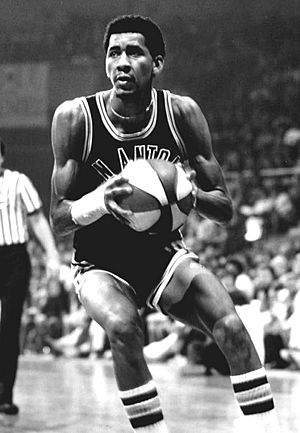
Even though some people doubted the ABA teams, the Spurs proved they belonged in the NBA. In their first NBA season (1976–77), they had a winning record. They also gained a new rival, the Houston Rockets.
During the 1977–78 season, George Gervin had an amazing battle for the NBA scoring title. On the last day of the season, he scored 63 points in a game to win the title! The Spurs also won their division that year. However, they lost in the playoffs. The next season, in 1979, the Spurs were close to reaching the NBA Finals but lost a heartbreaking Game 7. It would be 20 more years before they made it to the Finals.
The Spurs continued to be a strong team in the early 1980s, winning five division titles in their first seven years in the NBA. But they couldn't quite win a championship, often losing to strong teams like the Boston Celtics and the Los Angeles Lakers. After the 1984–85 season, Gervin, their biggest star, was traded. This marked the end of an important era for the Spurs.
Challenging Years (1985–1989)
The next four seasons were tough for the Spurs. They had losing records and fewer fans, which led to talk about the team moving to another city. But there was a bright spot: in 1987, the Spurs won the NBA draft lottery, which meant they got to pick first in the draft. They chose David Robinson, a talented player from the United States Naval Academy. Robinson had to serve two years in the Navy first, so he didn't join the team until the 1989–90 season. The 1988–89 season was the worst in franchise history at the time, but it also saw Larry Brown become the new head coach.
The David Robinson Era (1989–1997)
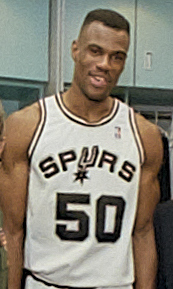
When David Robinson finally joined the Spurs for the 1989–90 season, everyone expected the team to get better, but no one expected such a huge change! With Robinson, Sean Elliott, and Terry Cummings, the Spurs had the biggest one-season improvement in NBA history. They went from having the worst record to the best in franchise history, winning their division for the first time in seven years. Robinson was named Rookie of the Year.
The Spurs became a regular playoff team in the 1990s. They moved into a new arena, the Alamodome, in 1993. In the 1994–95 season, the Spurs had the best record in the NBA, winning 62 games. Robinson was named the league's Most Valuable Player. They made it to the Western Conference Finals but lost to the Houston Rockets. After that season, Dennis Rodman, a player known for his rebounding, was traded.
The 1996–97 season was very difficult. Key players like Robinson and Elliott were injured for most of the season. The team finished with their worst record ever (20–62). This was the last time they missed the playoffs until the 2019–20 season. During this tough season, general manager Gregg Popovich took over as head coach. Even though the season was bad, it led to something great: the Spurs won the NBA draft lottery again and got the top pick in the 1997 NBA draft. They used this pick to select Tim Duncan, a future superstar.
The Tim Duncan Era (1997–2016)
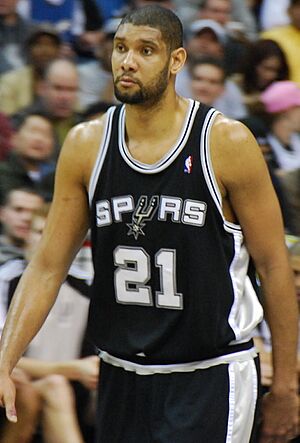
The "Twin Towers" (1997–2003)
With Tim Duncan joining David Robinson, the Spurs had two tall, talented players who became known as the "Twin Towers." They were both great at scoring and played amazing defense together. Duncan quickly became a dominant player, winning Rookie of the Year in 1998.
The 1998–99 season was shorter because of a player lockout, but the Spurs still had the best record in the NBA. They were unstoppable in the playoffs, losing only one game in the Western Conference. In the NBA Finals, they faced the New York Knicks and won the series 4-1, earning the franchise's first NBA Championship! Duncan was named the NBA Finals MVP. The Spurs were the first former ABA team to win an NBA title.
After their first championship, the Spurs continued to be one of the best teams. In 2002, they moved into a new arena, the SBC Center (now the Frost Bank Center). The 2002–03 season was special because it was David Robinson's last season. The team also had new young stars like Tony Parker and Manu Ginóbili. The Spurs had a fantastic season, tying for the best record in the NBA, and Tim Duncan won his second straight NBA MVP award. In the playoffs, they beat strong teams like the Lakers and Mavericks. In the NBA Finals, they faced the New Jersey Nets and won their second NBA Championship, 4-2. Duncan was again named Finals MVP.
The "Big Three" (2003–2011)
After David Robinson retired, the Spurs relied on their new "Big Three": Tim Duncan, Tony Parker, and Manu Ginóbili. They also added experienced players like Robert Horry. The team started the 2003–04 season slowly but quickly improved, winning many games in a row. They had a great record but lost a tough playoff series to the Los Angeles Lakers.
In the 2004–05 season, the Spurs were determined to win another championship. They added Brent Barry and Nazr Mohammed. They had one of the best records in the NBA. In the playoffs, they easily made it to the NBA Finals to face the defending champion Detroit Pistons. The series was very exciting, going to a deciding Game 7. In that final game, Duncan scored 25 points, and the Spurs won their third NBA title, 81–74. Duncan was named Finals MVP for the third time.
The Spurs continued to be a top team. In the 2005–06 season, they set a new franchise record with 63 wins. However, they lost a close playoff series to the Dallas Mavericks. In the 2006–07 season, the Spurs started slow but finished strong. They made it to the NBA Finals and swept the Cleveland Cavaliers, winning their fourth championship in nine years! Tony Parker was named Finals MVP, becoming the first European-born player to win the award.
The Spurs remained a strong team in the following years, often making deep playoff runs. They continued to win 50 or more games each season. In 2009, they traded some older players for younger talent like Richard Jefferson and drafted DeJuan Blair. In 2010, they were swept by the Phoenix Suns in the playoffs. In 2011, despite being the top seed, they were upset by the Memphis Grizzlies in the first round.
The Arrival of Kawhi Leonard (2011–2016)
In 2011, the Spurs made a big change. They started focusing on younger, athletic players. A key move was trading for Kawhi Leonard, a talented forward drafted by the Indiana Pacers. Leonard quickly became a starter.
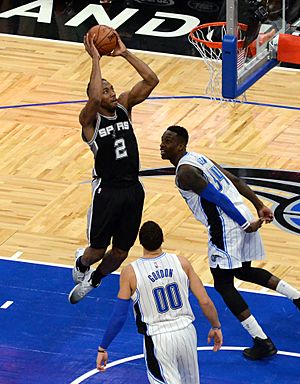
The 2011–12 season was shorter due to a lockout, but the Spurs still won 50 games, extending their record streak of 50+ win seasons to 13. Coach Popovich won his second Coach of the Year award. The Spurs swept their first two playoff rounds, winning 20 straight games overall. However, they lost to the Oklahoma City Thunder in the Western Conference Finals.
The Spurs had another strong season in 2012–13, winning 58 games. They made it to the NBA Finals to face the defending champion Miami Heat. The series was incredibly close. In Game 6, the Spurs were very close to winning the championship but lost in overtime after the Heat made some amazing shots. The Heat then won Game 7, taking the championship.
The Spurs came back strong in the 2013–14 season, winning 62 games and setting a franchise record with 19 straight wins. They had a tough first-round playoff series but then easily beat the Portland Trail Blazers. In the Western Conference Finals, they defeated the Oklahoma City Thunder to reach the Finals for a second year in a row, again facing the Miami Heat. This time, the Spurs dominated, winning the 2014 NBA championship in five games (4–1). They won their games by large margins. Kawhi Leonard had an amazing performance and was named NBA Finals MVP, becoming one of the youngest players to win it.
In 2014, the Spurs made history by hiring Becky Hammon as an assistant coach, making her the first full-time female coach in any major U.S. professional sports league. The 2014–15 season saw the Spurs finish strong, but they were eliminated in the first round of the playoffs by the Los Angeles Clippers.
Before the 2015–16 season, the Spurs added All-Star player LaMarcus Aldridge. They had an incredible season, winning a franchise-record 67 games and tying an NBA record for most home wins in a season (40–1). They also had the best defense in the league. However, they lost to the Oklahoma City Thunder in the second round of the playoffs. On July 11, 2016, Tim Duncan announced his retirement after 19 amazing seasons with the Spurs. He is one of the greatest players in NBA history.
Post-Duncan Era (2016–2023)
Leonard and Aldridge (2016–2018)
Even after Tim Duncan retired, the Spurs remained a top team in the 2016–17 season, led by Kawhi Leonard. They won 61 games and made it to the Western Conference Finals. However, injuries to Leonard, Parker, and David Lee hurt the team, and they were swept by the Golden State Warriors. Leonard's injury in Game 1 of the Conference Finals was a big moment.
The 2017–18 season was difficult due to Kawhi Leonard's injury and disagreements about his recovery. Leonard missed most of the season. The Spurs' amazing streak of eighteen 50-win seasons ended, as they finished with 47 wins. They lost to the Golden State Warriors in the first round of the playoffs. After the season, Leonard asked to be traded.
In July 2018, Kawhi Leonard and Danny Green were traded to the Toronto Raptors for DeMar DeRozan and Jakob Pöltl. Also, Tony Parker signed with another team after playing his entire 17-year career with the Spurs. In August, Manu Ginóbili announced his retirement after 16 seasons. For the first time since 1997, the Spurs started a season without any of their "Big Three" players. Despite losing Dejounte Murray to injury, the Spurs still made the playoffs for the 22nd straight season, but lost in seven games to the Denver Nuggets.
Challenging Years (2019–2023)
The 2019–20 NBA season was stopped early due to the COVID-19 pandemic. When it restarted in a special "NBA Bubble," the Spurs failed to make the playoffs for the first time since the 1996–97 season. This ended their record-tying streak of 22 consecutive playoff appearances. They also finished with a losing record for the first time since 1997.
The 2020–21 season was shorter. The Spurs started well but struggled later in the season. LaMarcus Aldridge left the team midway through. They made it to the play-in tournament but lost, missing the playoffs for a second straight season. After the season, DeMar DeRozan was traded, and Patty Mills, a longtime Spur, also left.
In the 2021–22 season, Dejounte Murray had a great year and was selected for the All-Star Game. The Spurs made the play-in tournament again but did not advance to the playoffs. The 2022–23 season was the team's worst since 1996–97. Dejounte Murray was traded, and the Spurs drafted several young players. On January 13, 2023, the Spurs set a regular season attendance record with 68,323 fans at the Alamodome for a game against the Golden State Warriors. San Antonio finished at the bottom of the Western Conference.
The Victor Wembanyama Era (2023–Present)
Wemby's Arrival and Historic Rookie Year (2023–2024)
On May 16, 2023, the Spurs won the NBA draft lottery, giving them the first pick in the 2023 NBA draft. This was their third time picking first overall, after David Robinson in 1987 and Tim Duncan in 1997. The Spurs used their top pick to select Victor Wembanyama, a highly anticipated player from France. Wembanyama had an amazing rookie year and was unanimously named NBA Rookie of the Year. He also finished second in voting for Defensive Player of the Year and set many other rookie records. The team finished 14th in the Western Conference.
Recent Seasons (2024–2025)
In the off-season, the Spurs signed experienced players like Chris Paul and Harrison Barnes. They also drafted Stephon Castle, who was later named Rookie of the Year for the 2024–25 season. Near the start of the 2024–25 season, head coach Gregg Popovich took a break due to health issues, and Mitch Johnson became the interim coach. Before the trade deadline, the Spurs acquired All-Star point guard De'Aaron Fox. Unfortunately, Wembanyama missed the rest of the season after 46 games due to blood clots. On May 2, 2025, Popovich announced he would step down as head coach but remain president of basketball operations, and Mitch Johnson was named the permanent head coach.
Team Rivalries
Los Angeles Lakers
From 1999 to 2004, the rivalry between the Spurs and the Los Angeles Lakers was considered one of the best in the NBA. These two teams met in the playoffs five times in six seasons. One of them always made it to the NBA Finals every year from 1999 to 2005.
Dallas Mavericks
The rivalry between the San Antonio Spurs and the Dallas Mavericks is special because both teams have roots in Dallas. In the 2012–13 season, the Spurs swept the Mavericks in their regular season games for the first time in a long time. In their last game that season, San Antonio won by just one point, which helped them secure a playoff spot for the 16th season in a row.
Phoenix Suns
The Spurs and the Phoenix Suns have played each other many times in the playoffs, with the Spurs winning more series. Their games have had some memorable moments, like Robert Horry's foul on Steve Nash in the 2007 playoffs, and Tim Duncan's game-tying three-pointer in the 2008 playoffs.
Houston Rockets
The rivalry between the Spurs and the Houston Rockets became exciting again in the 2017 playoffs. They met in the Western Conference Semifinals for the first time since 1995. In that series, the Spurs faced injuries to key players like Tony Parker and Kawhi Leonard. Despite the injuries, the Spurs won a thrilling Game 5 in overtime, thanks to Manu Ginóbili blocking a shot in the final seconds. The Spurs then won Game 6 to close out the series.
Team Logo and Uniforms
Since becoming the San Antonio Spurs in 1973, the team's colors have been black, silver, and white. The team's unique logo, with the word "Spurs" and a stylized spur instead of the letter U, has been part of their look since they moved to San Antonio. For a while, from 1989 to 2002, the logo also included "Fiesta colors" of pink, orange, and turquoise, even though the uniforms stayed black and white.
The Spurs have always worn black uniforms for away games and white uniforms for home games. Over the years, there have been small changes to the uniforms, like adding more trim to the numbers. They sometimes wear silver throwback jerseys to honor their older teams. Since 2002, they have worn black sneakers and socks for away games and white for home games.
In 2012, the Spurs introduced a silver alternate uniform that only featured the spur logo on the front. They also wore special uniforms with military camouflage patterns for a few games. Another black uniform with a similar design was added in 2015.
The Spurs also wear jerseys that say "Los Spurs" on the front to celebrate their Latino fans in San Antonio and across the Americas. These "Noches Latinas" events started in 2006. The Spurs have had many players from Latin America and Spain on their team.
When Nike became the uniform provider in 2017, the Spurs' main black, silver, and white uniforms stayed mostly the same. They also continued to wear camouflage-style uniforms. However, in 2020, they changed their "City" uniforms to a design inspired by the "Fiesta" colors from 1989–2002. They continued this "Fiesta" theme in 2021, adding elements from older uniforms. In 2022, they updated their silver uniforms to black with silver letters and a new "Texas spur" logo, inspired by traditional Mexican blankets. They also wore a turquoise "City" uniform. For the 2023–24 season, their "City" uniform honored Hemisfair '68, a world's fair held in San Antonio, with a white base and colorful stripes. This design was reused in light blue for the 2024–25 "City" uniform.
Team Mascot
The Coyote has been the Spurs' mascot since 1983. He is known for his funny skits and playful actions during games. The Coyote was inducted into the Mascot Hall of Fame in 2007.
Recent Season Records
Here are the results for the last five seasons the Spurs have completed.
Note: GP = Games played, W = Wins, L = Losses, W–L% = Winning percentage
| Season | GP | W | L | W–L% | Finish | Playoffs |
| 2020–21 | 72 | 33 | 39 | .458 | 3rd, Southwest | Did not qualify |
| 2021–22 | 82 | 34 | 48 | .415 | 4th, Southwest | Did not qualify |
| 2022–23 | 82 | 22 | 60 | .268 | 5th, Southwest | Did not qualify |
| 2023–24 | 82 | 22 | 60 | .268 | 5th, Southwest | Did not qualify |
| 2024–25 | 82 | 34 | 48 | .415 | 4th, Southwest | Did not qualify |
Arena History
Dallas (Texas) Chaparrals
- State Fair Coliseum (1967–1973)
- Moody Coliseum (1967–1973)
- Tarrant County Coliseum (1970–1971)
- Lubbock Municipal Coliseum (1970–1971)
San Antonio Spurs
- HemisFair Arena (1973–1993)
- Alamodome (1993–2002, 2023)
- Frost Bank Center (formerly SBC Center and AT&T Center) (2002–present)
Team Personnel
Retired Numbers
The Spurs have honored many of their greatest players by retiring their jersey numbers. This means no other player on the team will ever wear that number again.
| San Antonio Spurs Retired Numbers | ||||
| No. | Player | Position | Years Played | Date Retired |
|---|---|---|---|---|
| 00 | Johnny Moore | G | 1980–1987, 1989–1990 | March 20, 1998 |
| 6 | Avery Johnson | G | 1991, 1992–1993, 1994–2001 | December 22, 2007 |
| 9 | Tony Parker | G | 2001–2018 | November 11, 2019 |
| 12 1 | Bruce Bowen | F | 2001–2009 | March 21, 2012 |
| 13 | James Silas | G | 1972–1981 | February 28, 1984 |
| 20 | Manu Ginóbili | G | 2002–2018 | March 28, 2019 |
| 21 | Tim Duncan | F/C | 1997–2016 | December 18, 2016 |
| 32 | Sean Elliott | F | 1989–1993, 1994–2001 | March 6, 2005 |
| 44 | George Gervin | G | 1974–1985 | December 5, 1987 |
| 50 | David Robinson | C | 1989–2003 | November 10, 2003 |
Notes:
- 1 LaMarcus Aldridge wore the number from 2015 to 2021 with permission from Bruce Bowen.
- The NBA retired Bill Russell's No. 6 for all its teams on August 11, 2022.
Basketball Hall of Famers
Many great players and coaches from the San Antonio Spurs have been honored in the Basketball Hall of Fame.
| San Antonio Spurs Basketball Hall of Famers | ||||
|---|---|---|---|---|
| Players | ||||
| No. | Name | Position | Years with Team | Inducted |
| 16 | Cliff Hagan 1 | F/G | 1967–1969 | 1978 |
| 44 | George Gervin | G/F | 1974–1985 | 1996 |
| 2 | Moses Malone | C/F | 1994–1995 | 2001 |
| 21 | Dominique Wilkins | F | 1996–1997 | 2006 |
| 50 | David Robinson 2 | C | 1989–2003 | 2009 |
| 53 | Artis Gilmore | C | 1982–1987 | 2011 |
| 10 | Dennis Rodman | F | 1993–1995 | 2011 |
| 10 | Louie Dampier | G | 1976–1979 | 2015 |
| 1 | Tracy McGrady | G/F | 2013 | 2017 |
| 10 | Maurice Cheeks | G | 1989–1990 | 2018 |
| 21 | Tim Duncan | F | 1997–2016 | 2020 |
| 20 | Manu Ginóbili | G | 2002–2018 | 2022 |
| 16 | Pau Gasol | F/C | 2016–2019 | 2023 |
| 9 | Tony Parker | G | 2001–2018 | 2023 |
| Coaches | ||||
| Larry Brown | Head coach | 1988–1992 | 2002 | |
| Jerry Tarkanian | Head coach | 1992 | 2013 | |
| 22 | George Karl 3 | Assistant coach | 1978–1980 | 2022 |
| Gregg Popovich | Assistant coach Head coach |
1988–1992 1996–2025 |
2023 | |
| Contributors | ||||
| Cotton Fitzsimmons | Head coach | 1984–1986 | 2021 | |
Notes:
- 1 He also coached the team from 1967–1970.
- 2 Robinson was inducted twice: as a player and as a member of the 1992 Olympic team.
- 3 He also played for the team (1973–1978).
FIBA Hall of Famers
Some Spurs players have also been inducted into the FIBA Hall of Fame, which honors international basketball stars.
| San Antonio Spurs Hall of Famers | ||||
|---|---|---|---|---|
| Players | ||||
| No. | Name | Position | Years with Team | Inducted |
| 50 | David Robinson 1 | C | 1989–2003 | 2013 |
| 10 | Andrew Gaze | G | 1999 | 2013 |
| 7 | Fabricio Oberto | C | 2005–2009 | 2019 |
| Coaches | ||||
| Ettore Messina | Assistant coach | 2014–2019 | 2021 | |
Notes:
- 1 Robinson was inducted twice: as a player and as a member of the 1992 Olympic team.
Franchise Leaders
These tables show the top players in different statistical categories for the Spurs, including both their ABA and NBA years.
Points Scored (Regular Season) as of the end of the 2024–25 season
- Tim Duncan (26,496)
- George Gervin* (23,602)
- David Robinson (20,790)
- Tony Parker (18,943)
- Manu Ginóbili (14,043)
- James Silas* (10,290)
- Mike Mitchell (9,799)
- Sean Elliott (9,659)
- Larry Kenon* (8,248)
- LaMarcus Aldridge (7,325)
- Kawhi Leonard (6,654)
- Avery Johnson (6,486)
- Rich Jones* (6,466)
- Alvin Robertson (6,285)
- Patty Mills (6,218)
- Artis Gilmore (6,127)
- John Beasley* (5,983)
- Willie Anderson (5,946)
- Keldon Johnson (5,761)
- Mark Olberding* (5,626)
Other Statistics (Regular Season) as of the end of the 2024–25 season
| Most Minutes Played | |
|---|---|
| Player | Minutes |
| Tim Duncan | 47,368 |
| Tony Parker | 37,276 |
| David Robinson | 34,271 |
| George Gervin* | 31,115 |
| Manu Ginóbili | 26,859 |
| Sean Elliott | 22,093 |
| Avery Johnson | 20,009 |
| James Silas* | 18,916 |
| Bruce Bowen | 18,689 |
| Mike Mitchell | 15,992 |
| Most Rebounds | |
|---|---|
| Player | Rebounds |
| Tim Duncan | 15,091 |
| David Robinson | 10,497 |
| George Gervin* | 4,841 |
| Larry Kenon* | 4,114 |
| Manu Ginóbili | 3,697 |
| John Beasley* | 3,673 |
| Artis Gilmore | 3,671 |
| Tony Parker | 3,313 |
| Billy Paultz* | 3,203 |
| Rich Jones* | 3,137 |
| Most Assists | |
|---|---|
| Player | Assists |
| Tony Parker | 6,829 |
| Avery Johnson | 4,474 |
| Tim Duncan | 4,225 |
| Manu Ginóbili | 4,001 |
| Johnny Moore | 3,865 |
| George Gervin | 2,523 |
| David Robinson | 2,441 |
| James Silas | 2,406 |
| Alvin Robertson | 2,094 |
| Mike Gale* | 1,878 |
| Most Steals | |
|---|---|
| Player | Steals |
| Manu Ginóbili | 1,392 |
| David Robinson | 1,388 |
| George Gervin* | 1,159 |
| Alvin Robertson | 1,128 |
| Tony Parker | 1,032 |
| Tim Duncan | 1,025 |
| Johnny Moore | 1,017 |
| Mike Gale* | 803 |
| Kawhi Leonard | 723 |
| Avery Johnson | 712 |
| Most Blocks | |
|---|---|
| Player | Blocks |
| Tim Duncan | 3,020 |
| David Robinson | 2,954 |
| George Gervin* | 938 |
| Billy Paultz* | 796 |
| Artis Gilmore | 700 |
| George T. Johnson | 512 |
| LaMarcus Aldridge | 471 |
| Jakob Pöltl | 456 |
| Danny Green | 450 |
| Victor Wembanyama | 430 |
| Most Three-Pointers Made | |
|---|---|
| Player | 3-pointers made |
| Manu Ginóbili | 1,495 |
| Patty Mills | 1,171 |
| Danny Green | 959 |
| Bruce Bowen | 661 |
| Matt Bonner | 656 |
| Devin Vassell | 616 |
| Keldon Johnson | 580 |
| Sean Elliott | 563 |
| Kawhi Leonard | 529 |
| Tony Parker | 506 |
Individual Awards
NBA Individual Awards
- David Robinson – 1995
- Tim Duncan – 2002, 2003
- Tim Duncan – 1999, 2003, 2005
- Tony Parker – 2007
- Kawhi Leonard – 2014
NBA Rookie of the Year
- David Robinson – 1990
- Tim Duncan – 1998
- Victor Wembanyama – 2024
- Stephon Castle – 2025
NBA Defensive Player of the Year
- Alvin Robertson – 1986
- David Robinson – 1992
- Kawhi Leonard – 2015, 2016
NBA Sixth Man of the Year
- Manu Ginóbili – 2008
NBA Most Improved Player Award
- Alvin Robertson – 1986
NBA Coach of the Year
- Gregg Popovich – 2003, 2012, 2014
NBA Executive of the Year
- Angelo Drossos – 1978
- Bob Bass – 1990
- R.C. Buford – 2014, 2016
NBA Sportsmanship Award
- Avery Johnson – 1998
- David Robinson – 2001
- Steve Smith – 2002
J. Walter Kennedy Citizenship Award
- David Robinson – 2003
Twyman–Stokes Teammate of the Year Award
- Tim Duncan – 2015
NBA scoring champion
- George Gervin – 1978, 1979, 1980, 1982
- David Robinson – 1994
NBA Rebounding Leader
- David Robinson – 1991
- Dennis Rodman – 1994, 1995
NBA Assists Leader
- Johnny Moore – 1982
NBA Blocks Leader
- George T. Johnson – 1981, 1982
- David Robinson – 1992
- Victor Wembanyama – 2024, 2025
NBA Steals Leader
- Alvin Robertson – 1986, 1987
- Kawhi Leonard – 2015
- Dejounte Murray – 2022
All-NBA First Team
- George Gervin – 1978–1982
- David Robinson – 1991, 1992, 1995, 1996
- Tim Duncan – 1998–2005, 2007, 2013
- Kawhi Leonard – 2016, 2017
All-NBA Second Team
- George Gervin – 1977, 1983
- Alvin Robertson – 1986
- David Robinson – 1994, 1998
- Tim Duncan – 2006, 2008, 2009
- Tony Parker – 2012–2014
- LaMarcus Aldridge – 2018
All-NBA Third Team
- David Robinson – 1990, 1993, 2000, 2001
- Dennis Rodman – 1995
- Tim Duncan – 2010, 2015
- Manu Ginóbili – 2008, 2011
- Tony Parker – 2009
- LaMarcus Aldridge – 2016
NBA All-Defensive First Team
- Alvin Robertson – 1987
- David Robinson – 1991, 1992, 1995, 1996
- Dennis Rodman – 1995
- Tim Duncan – 1999–2003, 2005, 2007, 2008
- Bruce Bowen – 2004–2008
- Kawhi Leonard – 2015–2017
- Victor Wembanyama – 2024
NBA All-Defensive Second Team
- George Johnson – 1981
- Alvin Robertson – 1986, 1988, 1989
- David Robinson – 1990, 1993, 1994, 1998
- Dennis Rodman – 1994
- Tim Duncan – 1998, 2004, 2006, 2009, 2010, 2013, 2015
- Bruce Bowen – 2002, 2003
- Kawhi Leonard – 2014
- Danny Green – 2017
- Dejounte Murray – 2018
NBA All-Rookie First Team
- Greg Anderson – 1988
- Willie Anderson – 1989
- David Robinson – 1990
- Tim Duncan – 1998
- Tony Parker – 2002
- Gary Neal – 2011
- Kawhi Leonard – 2012
- Victor Wembanyama – 2024
- Stephon Castle – 2025
NBA All-Rookie Second Team
- Sean Elliott – 1990
- Manu Ginóbili – 2003
- DeJuan Blair – 2010
- Jeremy Sochan – 2023
NBA All-Star Weekend Honors
- George Gervin – 1977–1985
- Larry Kenon – 1978, 1979
- Artis Gilmore – 1983, 1986
- Alvin Robertson – 1986–1988
- David Robinson – 1990–1996, 1998, 2000, 2001
- Sean Elliott – 1993, 1996
- Tim Duncan – 1998, 2000–2011, 2013, 2015
- Manu Ginóbili – 2005, 2011
- Tony Parker – 2006, 2007, 2009, 2012–2014
- Kawhi Leonard – 2016, 2017
- LaMarcus Aldridge – 2016, 2018, 2019
- Dejounte Murray – 2022
- Victor Wembanyama – 2025
Slam Dunk Contest
- Edgar Jones – 1984
- Johnny Dawkins – 1987
- Greg Anderson – 1988
- Stephon Castle – 2025
Three-Point Contest
- Dale Ellis – 1994
- Chuck Person – 1995
- Terry Porter – 2000
- Steve Smith – 2002
- Roger Mason – 2009
- Matt Bonner – 2013
- Marco Belinelli – 2014, 2015
NBA All-Star Game Head Coaches
- Gregg Popovich – 2005, 2011, 2013, 2016
NBA All-Star Game Most Valuable Player Award
- George Gervin – 1980
- Tim Duncan – 2000
Rising Stars Challenge
- Tony Parker – 2002, 2003
- Manu Ginobili – 2004
- Beno Udrih – 2005
- DeJuan Blair – 2010, 2011
- Gary Neal – 2011
- Kawhi Leonard – 2012, 2013
- Tiago Splitter – 2012
- Jonathon Simmons – 2017
- Keldon Johnson – 2021
- Jeremy Sochan – 2023, 2024
- Victor Wembanyama – 2024, 2025
- Stephon Castle – 2025
Skills Challenge
- Tony Parker – 2003, 2009, 2012
- Victor Wembanyama – 2024, 2025
- Chris Paul – 2025
Shooting Stars Competition
- Manu Ginobili – 2004
- Tony Parker – 2006, 2007
- Tim Duncan – 2008, 2009
ABA Individual Awards
Before joining the NBA, the Spurs (as the Chaparrals) also had players and coaches who won awards in the ABA.
ABA Coach of the Year Award
- Tom Nissalke – 1972
ABA Executive of the Year Award
- Jack Ankerson – 1974
ABA Rookie of the Year Award
- Swen Nater – 1974
All-ABA First Team
- Donnie Freeman – 1972
- James Silas – 1976
All-ABA Second Team
- John Beasley – 1968, 1969
- Cincinnatus Powell – 1968
- Donnie Freeman – 1971
- Swen Nater – 1974, 1975
- George Gervin – 1975, 1976
- James Silas – 1975
ABA All-Rookie Team
- Ron Boone – 1969
- Joe Hamilton – 1971
- James Silas – 1973
- Swen Nater – 1974
- Mark Olberding – 1976
ABA All-Star Game Most Valuable Player Award
- John Beasley – 1969
ABA All-Star Selections
- John Beasley – 1968–1970
- Cliff Hagan – 1968
- Glen Combs – 1970
- Cincinnatus Powell – 1970
- Donnie Freeman – 1971, 1972
- Steve Jones – 1972
- Rich Jones – 1973, 1974
- Swen Nater – 1974, 1975
- George Gervin – 1975, 1976
- James Silas – 1975, 1976
- Larry Kenon – 1976
- Billy Paultz – 1976
Head Coaches
The Spurs have had many coaches throughout their history.
See also
 In Spanish: San Antonio Spurs para niños
In Spanish: San Antonio Spurs para niños
 | Madam C. J. Walker |
 | Janet Emerson Bashen |
 | Annie Turnbo Malone |
 | Maggie L. Walker |


